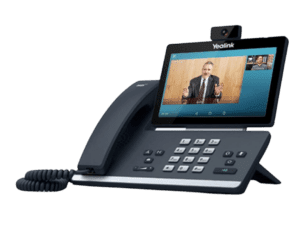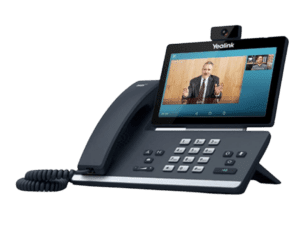 The typical high-definition audio stream consumes about 40 Kbps of bandwidth. Now consider that a jump to low-resolution VP8 video conferencing bandwidth more than quadruples that amount of data per second. Even more impressive is that HD video explodes the streaming requirement to a whopping 1,500 Kbps. That’s greater than 37 times the amount of audio alone.
The typical high-definition audio stream consumes about 40 Kbps of bandwidth. Now consider that a jump to low-resolution VP8 video conferencing bandwidth more than quadruples that amount of data per second. Even more impressive is that HD video explodes the streaming requirement to a whopping 1,500 Kbps. That’s greater than 37 times the amount of audio alone.
Interested in our new Video Calling feature, but worried about your internet connection’s capability? You’re in luck because most broadband internet connections will have the ability to transfer HD audio and low-resolution video without an issue. You might even be lucky enough to smoothly stream HD audio and video without a a network slowdown.
Part of our job at VirtualPBX is to help you understand the manner in which video calls will take place on our network. We show a few figures below related to internet speed, so take a minute to perform a brief speed test to see how your connection measures up.
A Quick Note About Codecs
All audio and video information that passes through the internet requires the use of a codec. A codec is simply a computer program that encodes or decodes information. It allows two computers to communicate with one another by using a common language.
The common language our Video Calling service defaults to is VP8. This is ideal for vp8 video conferencing. This open-standards codec works in all major web browsers and is supported on many other hardware devices. It’s a great choice, therefore, to match well with testing desk phones and softphones as we prepare for the public launch of Video Calling.
We also support a few other similar codecs. It isn’t necessary that we dig into the details of these codecs and how they work. For most VirtualPBX Phone Plan users, it’s only necessary to know that these codecs help us work with a wide range of devices. You can begin a deeper dive into the VP8 video conferencing codec with the Wikipedia articles linked here.
Video Conferencing Bandwidth Requirements
VP8 video conferencing bandwidth are the primary concern for video conferencing users. In short, people what to know if their internet will clearly and reliably handle video calls.
We have built our Video Calling feature to respond to the unique needs of all our customers. Some businesses will have more bandwidth to spare than others; this means they can consistently stream video at higher resolutions. However, a common internet connection does not bar you from participating in video. Video Calling will adapt to your needs as a user.
| Video Resolution (VP8) | Bandwidth Required | Bandwidth Required (Simulcast) |
|---|---|---|
| HD Audio Only | 40 kbps | |
| Low-Res Video (240×180) + HD Audio | 150 kbps | 240 kbps |
| SD Video (640×480) + HD Audio | 540 kbps | 865 kbps |
| HD Video (1280×720) + HD Audio | 1,500 kbps | 2,500 kbps |
The table here shows the bandwidth requirements for various types of video resolutions like vp8 video conferencing. Simulcast values may be required during conferences with many participants in order to accommodate their device capabilities.
You can compared the values here with the bandwidth shown in your speed test. How does your internet speed align with the values shown here?
We Can Help Out
Some of our other services can help you improve the quality of your internet connection. A Network Health Check can determine what’s causing unwanted performance in your network, and VPN for VoIP can tunnel all your VoIP traffic to give it priority and keep it free from fluctuation in speed. Although we can’t make your internet move more quickly, we can help you better understand the nature of video and how it can work with your current business capabilities.
We’re available to chat 24/7 and will be happy to discuss Video Calling with you at length. Whether you have a question about VP8 video conferencing bandwidth requirements or the devices on which our service will work, we’re happy to let you know how VirtualPBX will work with your business’s needs.







